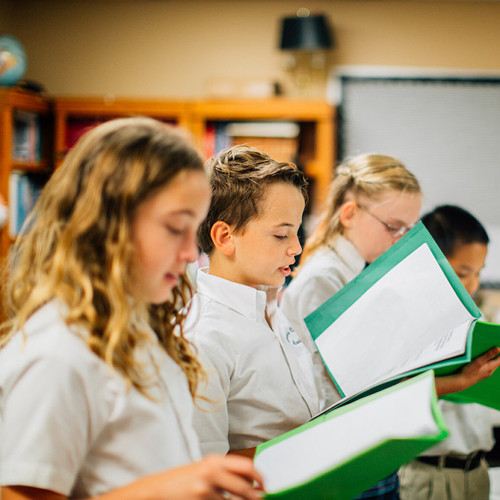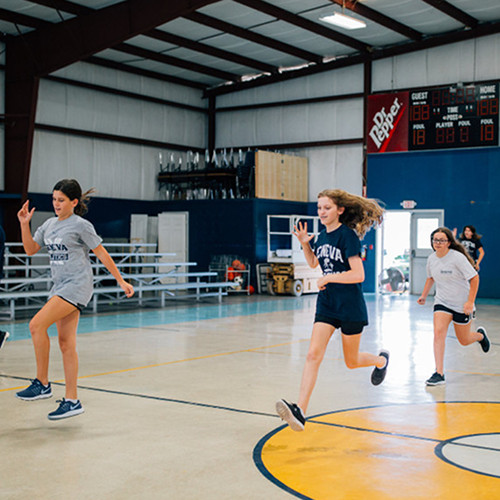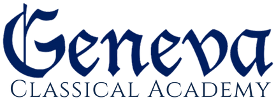No education is complete without teaching students to mirror the creativity of God through the arts and recreation. Students participate in instruction in the arts with a classical approach and a distinctly Christ-centered worldview. They then take this approach with them to the sports field in their athletic endeavors.

01.
The Grammar Stage
Children from kindergarten (4 and 5 year olds) to 5th grade are adept at memorizing large amounts of information. The youngest in this group can recite a book by heart while the older among them can rattle off whole parts of their favorite movie verbatim. The Grammar stage makes great use of this natural ability to give children a firm foundation of facts in math, phonograms, natural history, geography, science, etc.
02.
The Logic or Dialect Stage
As a child matures from 6th through 8th grade, he/she becomes naturally adept at argument. (Which is why pre and early teens begin to question authority.) In the Dialectic Stage children learn the ins and outs of formal logic. Logic enables them to assimilate the facts they learned in the Grammar Stage into a more thorough and cohesive understanding of their subjects and to arrange their thoughts in a rational and meaningful way.

03.
The Rhetoric Stage
Students have now honed their Socratic skills of asking questions and questioning answers, enabling them to engage the dominant ideas of past and present cultures.
The goal of classical Christian education is not just to graduate students with high GPA’s, who attend the best colleges and universities, or even pull down high-paying jobs. The crowning jewel of classical Christian education is raising individuals who impact their generation and generations to come with the knowledge, understanding, and wisdom found in the Gospel of Christ.
UPPER SCHOOL HOUSE SYSTEM
Alexandria . Jerusalem . Antioch . Constantinople . Rome
Drawing from the centuries-old tradition common in English boarding schools, GCA’s Upper School House System exists in order to make tangible what is already the case: we are a community, a student body. When my classmate is routinely doing his best work, showing up to class on time and ready to dig into the material at hand, working faithfully on his assignments with diligence, honesty, and integrity, I benefit. The whole class benefits. When, conversely, he’s lazy and sloppy in his work, inattentive and unprepared, he’s not the only one who suffers. We all suffer.
We want GCA to really be a community, one in which students care about and for one another. We want peers interested in each other’s academic and spiritual maturity and growth. We want, especially, older students leading and serving younger students. Our House System is designed specifically to fulfill such aims, drawing on such central Biblical principles as iron sharpening iron and brothers bearing one another’s burdens.
GCA’s House System seeks to fulfill these aims by assigning upper-school students to houses in which they will be incentivized to work together, the older students leading the younger, to build each other up and to stir each other up “to love and good works” (Hebrews 10:24).

Geneva Athletics
The significance of bodily exercise was not lost on the Apostle Paul, who used athletic competition as a metaphor for the Christian life:
Do you not know that in a race all the runners run, but only one gets the prize? Run in such a way as to get the prize. Everyone who competes in the games goes into strict training. They do it to get a crown that will not last; but we do it to get a crown that will last forever. (1 Corinthians 9:24-25)
The Heidelberg Catechism teaches that we “belong body and soul … to our faithful Savior, Jesus Christ.” Therefore we seek to honor our Savior by our use of our bodies, that our both our academics and our athletic competition might be pleasing in his sight.
Geneva Fine Arts



Musical Arts
Geneva teaches Music Appreciation to its Grammar students (kindergarten through sixth grade). The teaching emphasis is on music being a gift from God whereby we can enjoy Him and each other.
The Upper School intermittently offers a Music Appreciation course for Rhetoric students which is a study of the musical elements, the requisites of good and truly beautiful music, and the development of music throughout history, beginning with the ancient Greek and Roman periods.
Visual Arts
Art gives us a glimpse into societies otherwise long vanished. Art finds its expression in all areas of our daily lives, inspiring us and engaging us in the creative process even as we imitate God, the ultimate Creator.
All students take art at Geneva in an effort to instill in them an appreciation for the beauty of God’s creation and to inspire them to imitate that beauty in their own work.
Theatre Arts
Theatre arts students are taught, tested, and receive scores in GCA Performance Arts, Stage Logistics, The Artful Monologue Delivery, and The Anatomy of a Play. These lessons not only teach students theatre etiquette but also the skills necessary to audition for and perform in a production.



